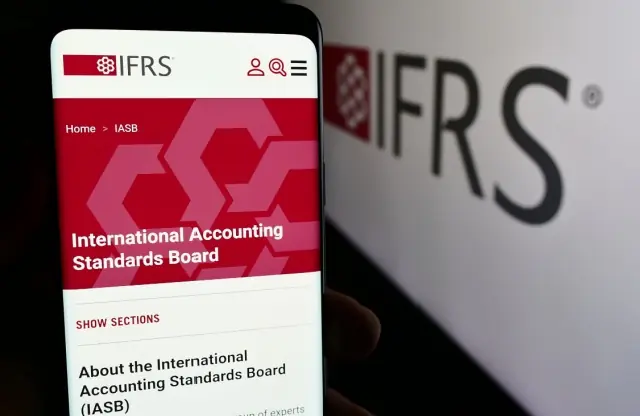A Quick Guide to the International Sustainability Standards Board
 Share
Share
 Copy Url
Copy Url

The International Sustainability Standards Board (ISSB) is making a big impact in sustainability. Created by the IFRS Foundation, the ISSB's main goal is to set a global baseline for sustainability reporting. This matters because companies now see how important it is to be transparent about environmental, social, and governance (ESG) practices. The ISSB gives clear guidelines to help businesses align their sustainability efforts with global standards. It also connects sustainability reporting with financial reporting, making sustainability a core part of a company’s financial health. Now that the ISSB includes the SASB, it’s ready to improve and strengthen global reporting standards.
In this article, we'll look at what the International Sustainability Standards Board does, how it’s linked to the IFRS Foundation, and how it helps create a global baseline for sustainability reporting. We’ll also cover how SASB standards fit into the ISSB framework, the role of financial reporting in sustainability, and why these efforts are important for businesses worldwide. Let’s explore how the ISSB is shaping the future of corporate responsibility and transparency.

What is the International Sustainability Standards Board or ISSB?
The International Sustainability Standards Board (ISSB) is a key global organization established by the IFRS Foundation. Its primary role is to create a global baseline of sustainability disclosures. This baseline guides companies in reporting on sustainability-related risks and opportunities. The ISSB was launched in 2021 during the COP26 climate conference. It was created to address the strong demand for better and more comparable sustainability information. Investors and stakeholders need this information to understand how sustainability issues impact a company’s financial health and long-term success.
The ISSB developed two main standards: IFRS S1 and IFRS S2. IFRS S1 focuses on general sustainability disclosures, while IFRS S2 addresses climate-related disclosures. These standards work alongside existing financial reports. This integration makes it easier for companies to share crucial information. The ISSB also incorporates frameworks like the SASB Standards. This approach ensures that the information is consistent and valuable for investors. According to ISSB Chair Emmanuel Faber, these standards will simplify the process for companies to meet both local and global reporting requirements.
Background of the ISSB and its Connection to the IFRS Foundation
The IFRS Foundation created the International Sustainability Standards Board (ISSB). It established the ISSB to meet the growing need for consistent sustainability reporting worldwide. It announced the formation of the ISSB in November 2021 during the COP26 climate conference. The IFRS Foundation took this step to address the challenges caused by fragmented sustainability disclosures. These inconsistencies made it difficult for investors and stakeholders to compare financial information related to sustainability across various companies and regions.
The ISSB is an independent organization. Its goal is to establish a global baseline for sustainability disclosures. The standards help investors by providing clear information about the risks and opportunities linked to sustainability. This information is crucial for understanding a company's long-term value. The ISSB ensures that these sustainability standards integrate with existing IFRS accounting standards. This integration guarantees that sustainability disclosures align with financial disclosures, offering a comprehensive view of a company's performance.
To build the ISSB, the IFRS Foundation consolidated several key organizations focused on sustainability reporting. This includes the Value Reporting Foundation, which managed the Sustainability Accounting Standards Board (SASB), and the Climate Disclosure Standards Board. By combining these organizations, the ISSB leverages existing expertise and frameworks. This approach makes it easier for companies to adopt the new standards. The ISSB also works closely with global stakeholders to ensure that the standards meet regional needs while maintaining international consistency.
The creation of the ISSB represents a significant step toward making sustainability reporting more consistent. This consistency helps companies provide reliable, comparable information that investors can use to make better decisions.

What are the ISSB's Goals?
The International Sustainability Standards Board (ISSB) created a global baseline for sustainability reporting standards. This global baseline aims to provide consistent and reliable sustainability disclosures that companies can use across different regions. Below are the key goals of the ISSB:
1. Create Global Sustainability Standards
The ISSB aims to create a unified set of sustainability reporting standards that companies worldwide can follow. It integrates existing frameworks like the SASB and the Global Reporting Initiative (GRI). This approach helps the ISSB simplify and harmonize global sustainability reporting requirements.
2. Promote Transparency in Reporting
One of the ISSB's goals is to enhance transparency in sustainability reporting. The board strives to ensure investors and stakeholders receive accurate and comparable data. This enables them to make informed decisions about a company's sustainability performance and risks.
3. Align Sustainability and Financial Disclosures
The ISSB emphasizes the importance of connecting sustainability reporting with financial disclosures. The ISSB aligns sustainability reporting with traditional financial reporting. This alignment ensures that sustainability risks and opportunities are considered alongside financial information. It provides a more comprehensive view of a company's performance.
4. Support Investor Protection through Value Reporting
The ISSB focuses on protecting investors by offering reliable information on environmental, social, and governance (ESG) factors. This information is vital for value reporting. It helps investors make ethical and informed decisions when assessing potential investments.
5. Help Global Collaboration
The ISSB collaborates with international organizations, emerging economies, and various stakeholders. This collaboration ensures that the sustainability reporting standards are globally applicable. It helps align the standards with the diverse needs of different regions while maintaining international consistency.
These goals reflect the ISSB's commitment to improving global sustainability reporting quality and consistency. This makes it easier for companies and investors to navigate the complex landscape of sustainability disclosures.

What are the new ISSB Standards?
The International Sustainability Standards Board (ISSB) recently introduced its first global sustainability disclosure standards: IFRS S1 and IFRS S2. These standards represent a significant move toward creating a consistent and comprehensive approach to sustainability reporting worldwide.
IFRS S1: General Requirements for Disclosure of Sustainability-related Financial Information
IFRS S1 sets basic rules for companies to report sustainability-related risks and opportunities. It aims to create a global baseline for sustainability reporting. The standard offers a consistent framework that can be applied across different countries. IFRS S1 incorporates other reporting frameworks such as the SASB Standards and the Task Force on Climate-related Financial Disclosures (TCFD). Companies must report how sustainability factors might impact their financial performance in the short, medium, and long term.
IFRS S2: Climate-related Disclosures
IFRS S2 focuses specifically on climate-related disclosures. It requires companies to report the risks and opportunities related to climate change and how these affect their financial outlook. IFRS S2 is designed to work alongside IFRS S1. This ensures that climate information is integrated into the company’s sustainability strategy. It also includes elements from the SASB Standards and TCFD to guide companies on climate-specific metrics.
Both IFRS S1 and IFRS S2 are built on the same concepts as existing IFRS standards. This compatibility ensures that these standards align with traditional financial reporting. Connecting sustainability and financial disclosures provides investors with a complete picture of a company’s performance. These standards also support digital financial reporting. This allows companies to share sustainability information in a format that is accessible and comparable everywhere.
These new standards simplify sustainability reporting by providing a unified framework. This framework can be adapted to different regulatory environments. The standards also emphasize the importance of offering useful information to investors. This helps to improve transparency and build trust in corporate sustainability practices.

What are the 4 Pillars of the ISSB?
The International Sustainability Standards Board (ISSB) structures its work around four main pillars. These pillars guide its mission to simplify global sustainability reporting and provide reliable information to investors and stakeholders. Here’s a simple breakdown of the four pillars:
1. Global Baseline
The first pillar focuses on setting a global baseline for sustainability disclosures. The ISSB aims to create standards that can be applied worldwide. These standards ensure consistency across different countries. The ISSB combines existing frameworks like the Sustainability Accounting Standards Board (SASB) and the Task Force on Climate-related Financial Disclosures (TCFD). This combination provides a unified framework that companies around the world can use.
2. Interoperability
The second pillar emphasizes making sure that ISSB standards work well with other reporting frameworks. The ISSB collaborates with organizations like the IFRS Foundation and Global Reporting Initiative (GRI). This collaboration aligns its standards with global disclosure needs. It helps companies use ISSB standards alongside other frameworks, making sustainability reporting easier and less confusing.
3. Transparency and Decision-Usefulness
The third pillar is about ensuring that sustainability reporting is clear and useful for decision-making. The ISSB requires companies to disclose information about sustainability risks and opportunities that could affect their financial performance. ISSB Chair Emmanuel Faber and ISSB Vice Chair Sue Lloyd stress the importance of providing clear and actionable information. This approach helps investors make informed decisions.
4. Flexibility in Application
The fourth pillar ensures flexibility in ISSB standards, allowing them to adapt to different regions and industries. The ISSB tailors its standards to meet specific industry needs and regulatory environments. This flexibility is crucial for ensuring that the standards are widely adopted and remain relevant across various markets.
Together, these pillars help the ISSB simplify the disclosure landscape. They provide high-quality, comparable sustainability information that supports better investment decisions and promotes global sustainability.

What Benefits does the ISSB offer?
The International Sustainability Standards Board (ISSB) provides several key benefits to companies and investors by creating a unified approach to sustainability reporting. These benefits aim to enhance transparency, simplify reporting processes, and support better decision-making. Here’s a breakdown of the key benefits:
1. Consistency and Comparability
The ISSB Standards offer a global baseline for sustainability disclosures. This ensures consistency across different regions, allowing companies to report comparably. This consistency reduces the complexity and fragmentation that often come with using different frameworks.
2. Enhanced Transparency
The ISSB enhances transparency by requiring companies to disclose sustainability-related risks and opportunities. This transparency gives investors clear and actionable information. It supports informed decision-making and helps prevent issues like greenwashing.
3. Streamlined Reporting Processes
The ISSB Standards integrate with existing frameworks, such as the Task Force on Climate-related Financial Disclosures (TCFD) and the Sustainability Accounting Standards Board (SASB). This integration simplifies the reporting process for companies, making it easier to meet global sustainability reporting requirements.
4. Improved Access to Capital
Companies that adopt ISSB Standards may gain better access to capital. The transparent and reliable information provided by these standards helps build investor trust. This trust can lead to more favorable financing conditions.
5. Global Adoption and Flexibility
Although the ISSB Standards are not mandatory worldwide, they are gaining widespread support. Countries like the UK and Australia are moving toward integrating these standards into their regulatory frameworks. The standards are also designed to be flexible, allowing them to be tailored to different jurisdictions and industry needs.
These benefits collectively help companies improve their sustainability reporting, making their disclosures more useful to investors and aligning with global sustainability goals.

Is ISSB mandatory?
The International Sustainability Standards Board (ISSB) standards are not mandatory globally. But, the adoption of these standards depends on jurisdictional decisions. The ISSB cannot enforce compliance. Yet, some countries, like the UK and Australia, are moving toward integrating these standards into their regulatory frameworks. This growing international support indicates that disclosure requirements based on ISSB standards may become mandatory in certain regions. The ISSB standards provide a global baseline. This allows for more jurisdictional requirements to be added as needed. Companies can also choose to adopt these standards voluntarily to align with global best practices.

Which countries are adopting ISSB? Is India among them?
The International Sustainability Standards Board (ISSB) is being adopted by many countries worldwide. Several regions, including the UK, Brazil, Canada, Singapore, and Japan, are integrating ISSB standards into their regulatory frameworks. These countries are either fully adopting the standards or adjusting their frameworks to align with ISSB's sustainability reporting frameworks.
India hasn't fully adopted the ISSB standards yet. Yet, it is making progress in sustainability reporting and considering adopting IFRS standards in the country. The Securities and Exchange Board of India (SEBI) introduced the Business Responsibility and Sustainability Report (BRSR) framework. This framework aligns with global practices like those of the ISSB. It allows companies in India to compare their disclosures with global standards. This shows India's commitment to improving its sustainability reporting practices.
Countries adopting the ISSB standards aim to create a consistent global baseline for sustainability disclosures. This effort has international support from organizations like the Financial Stability Board. It also helps companies applying IFRS standards to integrate sustainability reporting more effectively into their financial disclosures.

ISSB: Leading the Way in Global Sustainability Reporting
The International Sustainability Standards Board (ISSB) plays a key role in global sustainability reporting. It offers a unified approach that makes it easier and stronger for companies to share sustainability-related information. The ISSB focuses on creating standards that are consistent and comparable. This helps businesses align their sustainability efforts with global expectations and gives investors reliable data for informed decisions.
For companies wanting to stand out in this changing environment, professional report design is important. Report Yak, India’s top report design agency, specializes in creating impactful sustainability reports, ESG reports, environmental impact reports, and more. We make sure all reports follow the latest sustainability reporting frameworks and meet the guidelines from key bodies like the ISSB and the IFRS Foundation. Our work has been recognized with prestigious awards, including the LACP Spotlight Awards.
Explore samples of our award-winning reports on our Showcase page. For a full list of our services, visit our Services page. Need more information? Contact us via WhatsApp, call us at 1800 121 5955 (India), or email us at contact@reportyak.com. You can also fill out the Contact Form on our website, and we’ll get back to you promptly.
Related Posts
-
Integrated Reporting Made Easy For Modern Companies
annual reportAnnual Report design
+6
Dec 31, 2025Share
Copy Url
How To Adopt BRSR Guidelines For Success
Oct 15, 2025Share
Copy Url
Simplifying ESG Disclosure for Better Impact
corporate reportingenvironmental and social initiatives
+6
Aug 28, 2025Share
Copy Url


